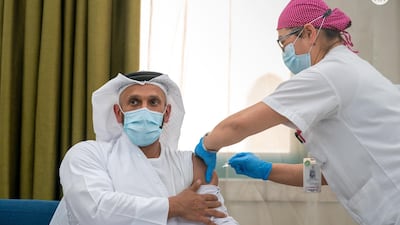We are on the cusp of an era of mass Covid-19 inoculation. The deployment of vaccines by drug makers Pfizer/BioNTech, AstraZeneca, Moderna, Sinopharm and Gamaleya Centre promises to put the pandemic behind us. Justifiably, there is plenty of optimism about a return to a more normal arc of life.
A select number of people in the UAE have taken the Chinese-made Sinopharm vaccine, which has been approved for limited – or emergency – use, following the phase 3 trials of the drug that were carried out in the country. These are early days in the UAE's national Covid-19 vaccine programme. This effort will be ramped up over the coming weeks and months as the country aims to protect as many of us as possible while helping people move past the crisis. The expectation is that many more nations will begin their immunisation programmes soon.
Those who are on the Sinopharm vaccine programme have to take two doses within a month. And a month thereafter, their bodies will hopefully have developed enough antibodies to give them some level of protection from the coronavirus.
But the idea of immunity at a global level feels theoretical. While many thousands of people in the UAE have already taken part in the national vaccine programme, as well as in the earlier trials, there are not yet enough who have taken the vaccine to produce "herd immunity", which is needed to ensure that we have the coronavirus under control. I am not sure that point will be reached for some time, both at home and abroad.
It is important to understand that not everybody feels entirely comfortable taking the vaccine right away all over the world. There is much hesitancy particularly regarding taking any Covid-19 vaccine, which has been quickly developed compared to previous inoculations. This hesitancy is evident from a wide range of responses I have garnered during conversations. Some have demonstrated a curiosity, while others have been alarmist. Most responses have been somewhere in between, with some among them making it clear that they do not judge the choices made by others while admitting they do not themselves have the desire to take a vaccine.
That vaccine hesitancy is real should not be news to anyone. It has, after all, been an issue since well before the pandemic. For at least a decade, health authorities around the world have tried to grapple with this growing trend. Every country and every strata of society in those countries have been affected to differing degrees by this phenomenon. It cannot just be blamed on anti-vaxxers and conspiracy theories, rather the hesitancy about taking vaccines is often related to issues such as complacency, lack of convenience or lack of confidence.
The third factor is arguably the most pressing one, because only a minority are complacent about the risks of this disease and how it is impacting our lives as compared to other illnesses that we have had a vaccine for, for some time. Likewise, a lack of convenience should not be a factor, especially in the future, with governments around the world hard at work to make it as easy as possible for the public to receive the vaccine should they want to.
According to research conducted by the World Health Organisation, all three factors are linked, and being weak on tackling any one of them on the part of the public will undermine the efforts to vaccinate the largest number of people.
How to build that confidence then? Consistent and clear communication is key, obviously, as it is the foundation upon which trust is built. Even after getting the messaging right, which is not at all easy, it needs time to have an effect. There is no short cut to a sustained and long-term information campaign that will convince people that they can take a vaccine safely. It may take years and there is the worry of the continuing consequences to our well-being if the pandemic drags on that long.
There has been some discussion, in Australia, the UK and elsewhere, of requiring people to show inoculation certificates in order to fly on planes or go to the cinema. However, trying to compel people to take a vaccine won't achieve the objective of mass inoculation. Human psychology would fight against the idea.
Countries will, of course, get to the point of herd immunity eventually. Of that there is no doubt. The question is only how long it will take. In the meantime, to smoothen the process, we must find new reserves of patience and empathy to help get the job – and the jab – done.
Mustafa Alrawi is an assistant editor-in-chief at The National


